5 Best Extensions to Manage Chrome Tabs & Memory
One of Chrome’s many strengths include syncing of all your bookmarks and Chrome extensions with a Google account, it also opens tabs in separate memory process so that you won’t have to shut it down entirely if one tab crashes.
However, the implementation of separate memory processes means it uses lots of memory when you open many tabs. This can cause performance hiccups for users who don’t have enough RAM on their computers.
Here are 5 tools to help you manage tabs and release memory for use on Chrome. If you surf the web a lot and open a lot of content in multiple tabs, these Chome extensions will be great in giving you a smoother web surfing experience without slowing down your computer too much, ultimately allowing you to multitask with other programs.
8 Chrome Extensions To Supercharge Your Omnibox Searches
When most people think of Chrome’s Omnibox, they think of it as an “address bar”, where you type. Read more
1. TooManyTabs
TooManyTabs is a great tab and memory manager with an easy to use and understand interface. Once installed, you will see this popup window where you can get a glance of all the opened tabs in that particular Chrome window. You can then choose to suspend tabs that you want to keep for later reading, freeing up some memory from Chrome so it runs faster and smoother.

2. Tab Hibernation
Tab Hibernation is a one-button tool that instantly puts all other tabs except the one you are currently vieweing into hibernation. Once installed, a button in the shape of a crescent moon will appear at the end of your address bar. Clicking on it will hibernate all your other tabs, freeing up Chrome’s memory for a smoother web surfing experience. To wake up a hibernated tab, just click anywhere.

3. OneTab
If you’re someone who surfs the web using lots of tabs and browser windows, OneTab compresses all the opened tabs in that particular window into one tab, so you can see the content of all opened tabs. Doing this also frees memory from Chrome. You can then choose to close tabs, open them one at a time or restore them all. You can also group these tabs into a special category, enabling you to open it at a later time.

4. TabMemFree
Don’t have time to manually manage the tons of tabs opened on your Chrome browser? You can try TabMemFree that automatically helps you “park” inactive tabs. Parking a tab frees up the memory of that particular tab. It does this automatically if you have not accessed that particular tab for more than 15 minutes; you can set a longer tab timeout period too. When you go back to that particular tab, it’ll automatically reload letting you return to where you left off.

5. The Great Suspender
The Great Suspender helps you suspend tabs to free up some of Chrome’s memory. Clicking on the Great Suspender button lets you choose from suspending the current tab, suspending all other tabs or restoring all your tabs. The tool allows for automatic and manual suspending, configurable in the settings. The settings also allow you to set a whitelist of sites that won’t get suspended.
How to Fix Firefox Memory Leak issue in Windows 10/11
Have you noticed Firefox using too much memory on your computer And as a result your PC not performing as expected. So What causes Firefox to use too much memory? Resource-consuming extensions, too many tabs are open, outdated versions of the browser, corrupt files are some common reasons that cause the Mozilla Firefox Memory Leak issue in Windows 10. Here in this post we have working solutions to apply If firefox consumes too much memory during general usage.
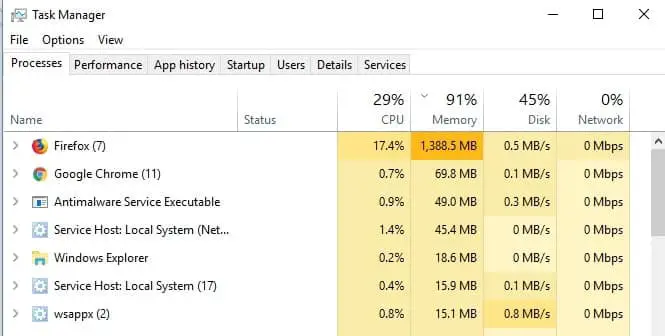
Note: Here the term, memory refers to available RAM on your computer and leak implies that the memory is temporarily lost or destroyed.
Advertisements
- 1 How to Prevent Firefox From Using Too Much Memory
- 1.1 Clear firefox cache Advertisements
- 1.2 Disable Any Disused Extensions
- 1.3 Update Firefox browser
- 1.4 Toggle off firefox Hardware Acceleration
- 1.5 Set Minimum Memory Usage
- 1.6 Use Fewer Tabs
- 1.7 Delete the content-prefs.sqlite File
- 1.8 Refresh Firefox
How to Prevent Firefox From Using Too Much Memory
First, check and confirm its firefox browser only consumes too much memory. To do this Close the fire fix browser and open task manager to check if the memory usage graph comes down.
Clear firefox cache
- Click on the menu button to open the menu panel.
- Click History and select Clear Recent History… .
- Next to Time range to clear, choose Everything from the drop-down menu, select Cache in the items list, make sure other items you want to keep are not selected and then click the OK button.
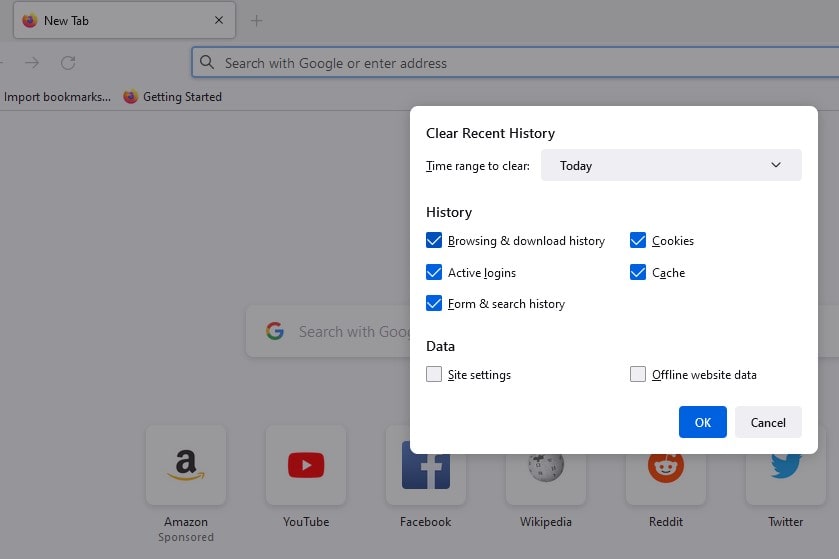
Disable Any Disused Extensions
The most common reason causing Mozilla firefox memory leak in windows 10 is because you have a variety of extensions that running in the background and consuming system resources. If you’re wondering whether a Firefox theme, plugin or extension is causing Firefox to use too much memory try to disable them by following the steps below.
- Open Firefox and select the hamburger menu icon in the top-right. From the menu, select the Add-ons option.
- Here in the Add-ons menu, you’ll see options for Extensions, Themes, and Plugins on the left.
- select extensions and disable or remove extensions from the right-hand side,
- Similarly, you can disable or remove themes and plugins from there
- Now restart the firefox browser and check if it’s running smoothly.
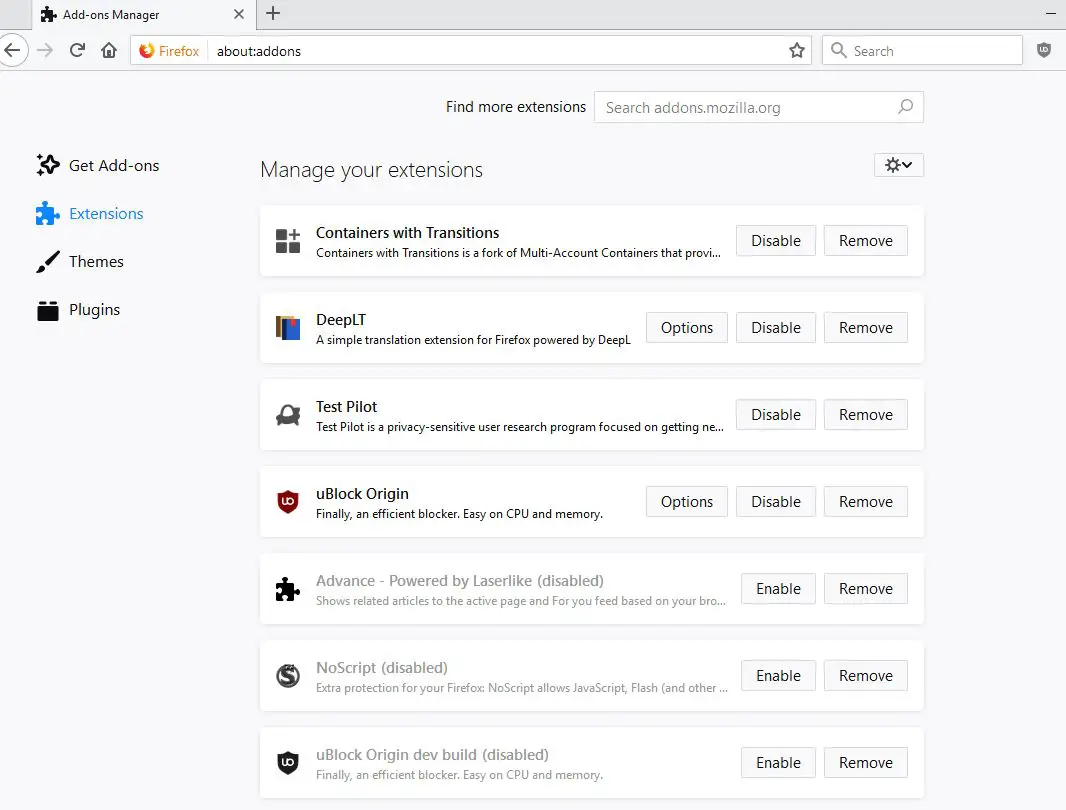
Update Firefox browser
How to fix windows 11 update stuck .
Please enable JavaScript
Updating the apps and software always bring performance improvements and fix minor bugs that may hit system performance. And updating the browser to the latest version probably have a bug fix for the issue causing Mozilla firefox memory leak.
- Click the menu at the upper right corner and select Help from the drop-down menu.
- Select About Firefox from the submenu. If there are any updates available, they will be installed automatically.
- After the download is complete, please restart to update Firefox.

Note: You can change your update settings by clicking Menu> Options and scrolling down to the Firefox Updates section.
Toggle off firefox Hardware Acceleration
Hardware Acceleration means, the browser dumps page rendering and other tasks onto your PCs hardware for faster performance. But sometimes this may cause problems depending on your configuration. Turn off hardware acceleration following the steps below and check if this improves system performance.
- Open the Firefox browser, click the Menu icon (three horizontal lines) in the upper-right corner then select settings.
- Also, you can access the same using about:preferences on the address bar.
- Scroll down and locate performance, here uncheck recommended performance settings option,
- Next Use hardware acceleration when available option will appear, uncheck this as well. Advertisements
- Restart the browser and See if your system performance improves.
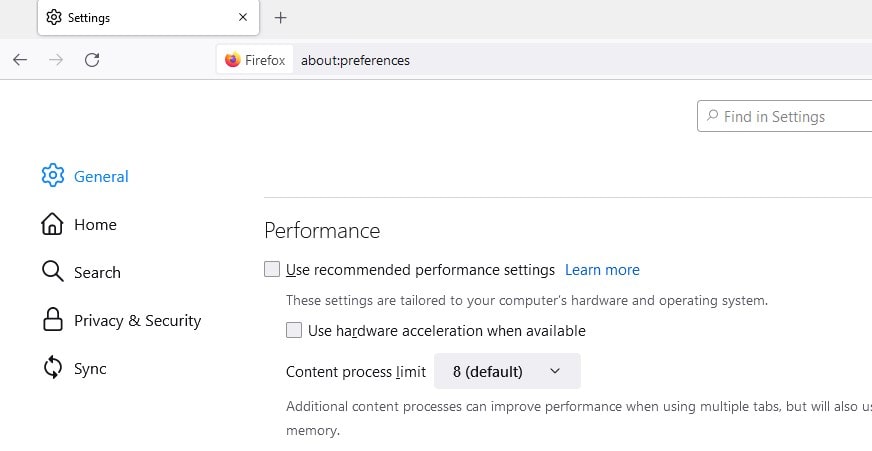
Set Minimum Memory Usage
Mozilla Firefox has a feature that can be used to minimize memory usage. To fix the Firefox hogging memory issue, you can enable this feature. Here’s how:
- Launch your Mozilla Firefox browser, and then type about:memory in the Address Bar and hit Enter.
- Click on the Minimize memory usage feature under the Free Memory tab.
- Now, restart your browser and see if Mozilla Firefox uses too much memory.

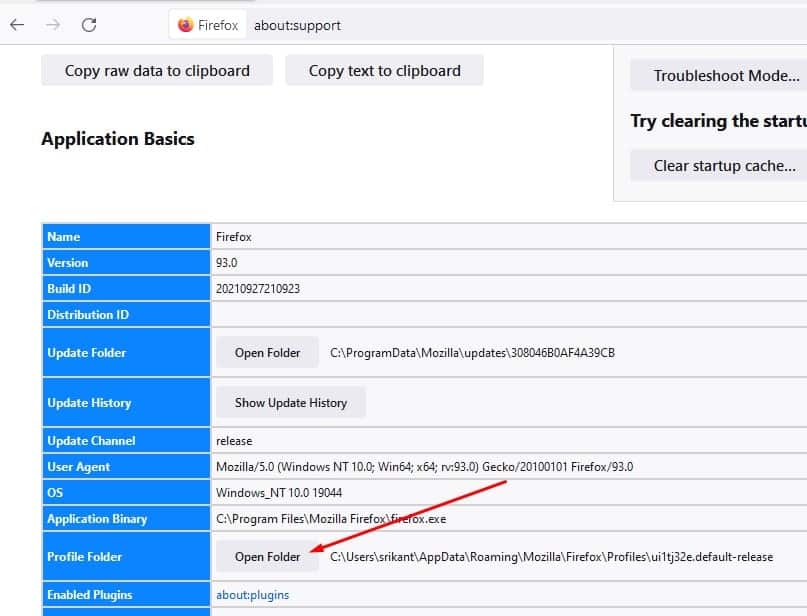
Copyright © 2023 |- Windows101Tricks. Not associated with Microsoft | All Logos & Trademark Belongs to Their Respective Owners| powered by CDN77
We are Reader supported: “When you buy through links on our site, we may earn an affiliate commission.”
При подготовке материала использовались источники:
https://www.hongkiat.com/blog/manage-chrome-memory-extensions/
https://windows101tricks.com/firefox-memory-leak/
 Онлайн Радио 24
Онлайн Радио 24